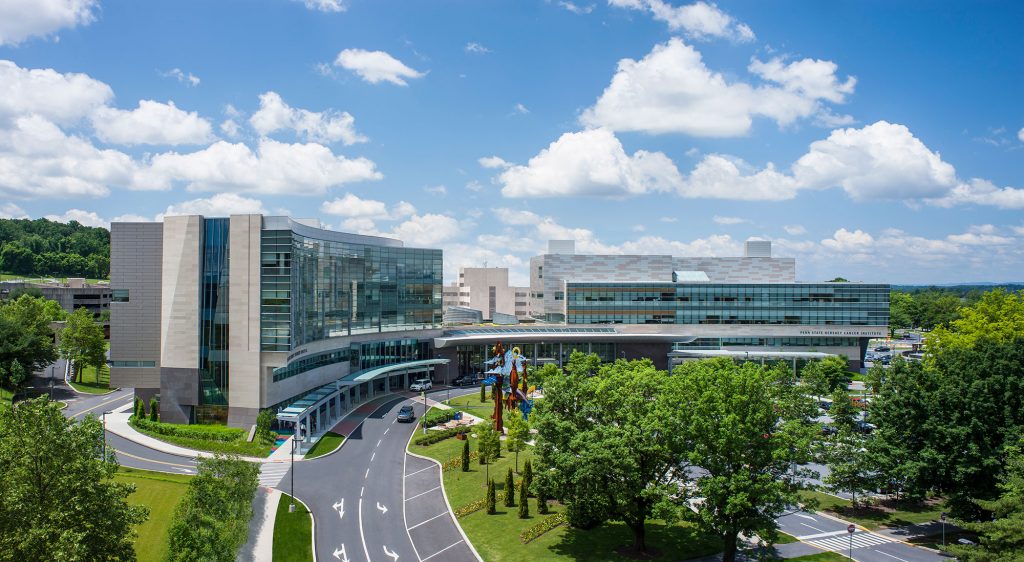Jump to topic
Search
Program Details
The Spinal Cord Injury Fellowship is open to those who have completed an approved residency in a specialty relevant to spinal cord injury medicine, such as physical medicine and rehabilitation, anesthesiology, emergency medicine, family practice, internal medicine, neurological surgery, neurology, orthopedic surgery, pediatrics, plastic surgery, surgery or urology.
Successful completion of the fellowship program satisfies the eligibility requirement to take the Examination in Spinal Cord Injury Medicine to obtain Subspecialty Certification in Spinal Cord Injury Medicine.
Fellows will be exposed to the broad spectrum of clinical management of spinal cord injury, including acute trauma and acute rehabilitation and post-acute rehabilitation, provided at Penn State Health Rehabilitation Hospital and Penn State Health Milton S. Hershey Medical Center training sites. Fellows will have the opportunity to take part in ongoing research studies or to develop their own projects.
Each fellow will have the opportunity to train with several outpatient physiatrists to learn spasticity management, including chemodeinnervation, baclofen pump refills and implantations. Fellows will have many opportunities to teach Physical Medicine and Rehabilitation residents and medical students. Fellows will also be able to interact and train with the many disciplines that contribute to spinal cord injury care, including neurosurgery, orthopaedics, endocrinology, neuro-urology, pulmonology, plastic surgery, wound care, physical and occupational therapy, wheelchair clinic and driving rehabilitation.
At the end of training, the fellow should be proficient in the prevention, diagnosis, treatment and management of traumatic spinal cord injury and nontraumatic myelopathies.
Penn State Health is also home to many spinal cord injury-focused community events, such as RecFest, in which hundreds of individuals with disability come together to learn about recreational activities. Other opportunities include spinal cord injury support groups, excursions for adaptive skiing and hunting, assisting those with disabilities in learning how to navigate airports and airplanes, and more.
Learn More about the Fellowship
The program will consist of one year with the following clinical rotations and continuity clinic:
- Eight months inpatient spinal cord injury and outpatient continuity clinic and pediatric spinal cord injury/spina bifida
- Two months spinal cord injury consult and outpatient continuity clinic and pediatric spinal cord injury/spina bifida
- One month research
- One month elective (including but not limited to electrodiagnoses, endocrine, neuro-urology, pulmonary, plastic surgery and wound care rotations)
All applicants must complete the SCI Fellowship Common Application and send it to program coordinator Michelle Osterlund at mosterlund@pennstatehealth.psu.edu.
All applicants must be graduates of an approved residency in a specialty relevant to spinal cord injury medicine, such as physical medicine and rehabilitation, anesthesiology, emergency medicine, family practice, internal medicine, neurological surgery, neurology, orthopedic surgery, pediatrics, plastic surgery, surgery or urology.
Virtual Tour
Penn State Health
Penn State Health is a multi-hospital health system serving patients and communities across 29 counties of Pennsylvania. Its mission is to improve health through patient care, research, education and community outreach.
In December 2017, the system partnered with Highmark Health to facilitate creation of a value-based, community care network in the region. The shared goal of Highmark and Penn State Health is to ensure patients in the community are within:
- 10 minutes of a Penn State Health primary care provider
- 20 minutes of Penn State Health specialty care
- 30 minutes of a Penn State Health acute care facility
Learn more about Penn State Health

Penn State Health Children’s Hospital (left), Penn State Health Milton S. Hershey Medical Center (center) and Penn State Cancer Institute (right)
Penn State Health Milton S. Hershey Medical Center
500 University Dr., Hershey, Pa., 17033 (Derry Township, Dauphin County)
- The health system’s 647-bed flagship teaching and research hospital
- The only medical facility in Pennsylvania accredited as both an adult and a pediatric Level I (highest-level) trauma center
- Dedicated surgical, neuroscience, cardiovascular, trauma and medical intensive care units
- Accredited Life Lion critical-care transport providing more than 1,100 helicopter and approximately 750 ground ambulance transports per year
- More than 1,300 faculty members and more than 650 residents and fellows
- Approximately 29,000 admissions, 73,000 emergency department visits, 1.1 million outpatient visits and 33,000 surgical procedures annually
- Designated as a Magnet hospital since 2007
Learn more about Milton S. Hershey Medical Center
Penn State Health Children’s Hospital
600 University Dr., Hershey, Pa. 17033 (Derry Township, Dauphin County)
- An eight-story, 263,000-square-foot-facility built in 2013 and expanded in 2020
- 160 licensed pediatric beds, 26-bed pediatric intensive care unit and a 56-bed neonatal intensive care unit
- Level IV (highest-level) neonatal intensive care unit
- Level I quaternary (highest-level) pediatric intensive care unit
- Level I (highest-level) pediatric trauma center designation
- Intermediate care unit
- Dedicated pediatric operating rooms
- More than 150,000 pediatric outpatient visits, 20,000 pediatric emergency room visits, and approximately 5,000 pediatric patient discharges annually
Welcome to Hershey
More About Hershey
Interested in learning more about living and working in Hershey, Pa.? See details here:
Wellness, including emotional, spiritual, social and physical health, is a crucial component to training and to becoming a professional, compassionate and resilient physician. Self-care is a skill which must be continually practiced and reinforced. Penn State College of Medicine and Penn State Health are committed to addressing wellness among residents and fellows, with multiple resources readily available.
Institutional resources
- Visit BeWell – a health program designed to support Penn State Health employees
- See Penn State College of Medicine wellness resources here
- Employee Health Care Concierge and Case Management Service
- Partners in Medicine
Moving to a new city with your family does not have to be stressful. Residency programs have assisted many significant others with finding employment. There is also a GME-Wide Partners in Medicine (PIM) group that offers networking opportunities as well as various social and community oriented activities. - The Doctors Kienle Center for Humanistic Medicine
- Active and easily accessed Office of Professional Mental Health
Graduate medical education resources
Institutional Resources
Penn State Health and Penn State College of Medicine celebrate, embrace and support the diversity of all patients, faculty, staff, students and trainees.
Office for Diversity, Equity and Inclusion
In keeping with this, Penn State Health has an active Office for Diversity, Equity and Inclusion with various programs, networks and resource groups, including:
- Talks and lectures on diversity, equity and inclusion through the Inclusion Academy
- Regular events on topics such as eradicating racism and creating a culture of inclusiveness
- Many Business Employee Resource Groups (BERGs), including:
- Disability Business Employee Resource Group
- Interfaith Business Employee Resource Group
- LGBTQ+ Business Employee Resource Group
- Military and Veterans Business Employee Resource Group
- Multicultural Business Employee Resource Group
- NextGen Business Employee Resource Group
- Black Physician Professional Staff Association – Resource Group
- Hispanic Professional Association
- Asian Physician and Professional Staff Association
- International Workforce Inclusion
Learn more about the Penn State Health Office for Diversity, Equity and Inclusion
Learn more about the College of Medicine’s Office for Diversity, Equity and Belonging
Office for Culturally Responsive Health Care Education
The vision at Penn State College of Medicine and Penn State Health is to equip learners with the knowledge, skills and attitudes they will need to provide culturally excellent health care and research for an increasingly diverse U.S. population. The Office for Culturally Responsive Health Care Education was formed to help meet that goal.
Learn more about the Office for Culturally Responsive Health Care Education
Office for a Respectful Learning Environment
In addition, the institution does not tolerate discrimination, biases, microaggression, harassment or learner mistreatment of any kind, and any concerns are immediately addressed by the Office for a Respectful Learning Environment.
Learn more about the Office for a Respectful Learning Environment
Network of Under-represented Residents and Fellows
The Network of Under-represented Residents and Fellows (NURF) is a group of diverse residents and fellows representing all specialties. NURF’s goal is to promote cultural diversity in the residency programs through community involvement, mentorship with diverse faculty, professional networking and support for the recruitment of diverse medical students into the residency programs.
NURF is sponsored by the Penn State College of Medicine Graduate Medical Education Office and the Penn State Health Office for Diversity, Equity and Inclusion.
Fellow Honors and Recognitions
Penn State College of Medicine and Penn State Health Milton S. Hershey Medical Center accept ongoing nominations for the Exceptional Moments in Teaching award.
The award, given monthly by the Office for a Respectful Learning Environment, accepts nominations from College of Medicine students who are invited to submit narratives about faculty members, residents, fellows, nurses or any other educators who challenge them and provide an exceptional learning experience. See more about the award here.
Previous nominees from the Spinal Cord Injury Fellowship are listed here. Click the + next to a nominee name to read their nominator’s comments.
Latest News from Physical Medicine and Rehabilitation





